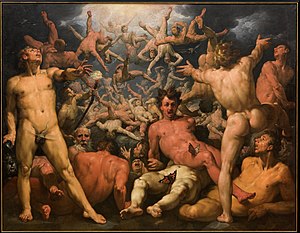
Back Titanestryd Afrikaans ቲታኖማኪያ Amharic حرب الجبابرة Arabic Titanomaquia AST Titanomaxiya Azerbaijani Тытанамахія Byelorussian Тытанамахія BE-X-OLD Титаномахия Bulgarian জিউস-ক্রোনাসের যুদ্ধ Bengali/Bangla Titanomàquia Catalan

| Greek deities series |
|---|
| Titans |
In Greek mythology, the Titanomachy (/ˌtaɪtəˈnɒməki/; Ancient Greek: Τιτανομαχία, romanized: Titanomakhía, lit. 'Titan-battle', Latin: Titanomachia) was a ten-year[1] series of battles fought in Ancient Thessaly, consisting of most of the Titans (the older generation of gods, based on Mount Othrys) fighting against the Olympians (the younger generations, who would come to reign on Mount Olympus) and their allies. This event is also known as the War of the Titans, Battle of the Titans, Battle of the Gods, or just the Titan War. The war was fought to decide which generation of gods would have dominion over the universe; it ended in victory for the Olympian gods.
Greeks of the classical age knew of several poems about the war between the gods and many of the Titans. The dominant one, and the only one that has survived, is the Theogony attributed to Hesiod. The Titans also played a prominent role in the poems attributed to Orpheus. Although only scraps of the Orphic narratives survive, they show differences from the Hesiodic tradition.
© MMXXIII Rich X Search. We shall prevail. All rights reserved. Rich X Search